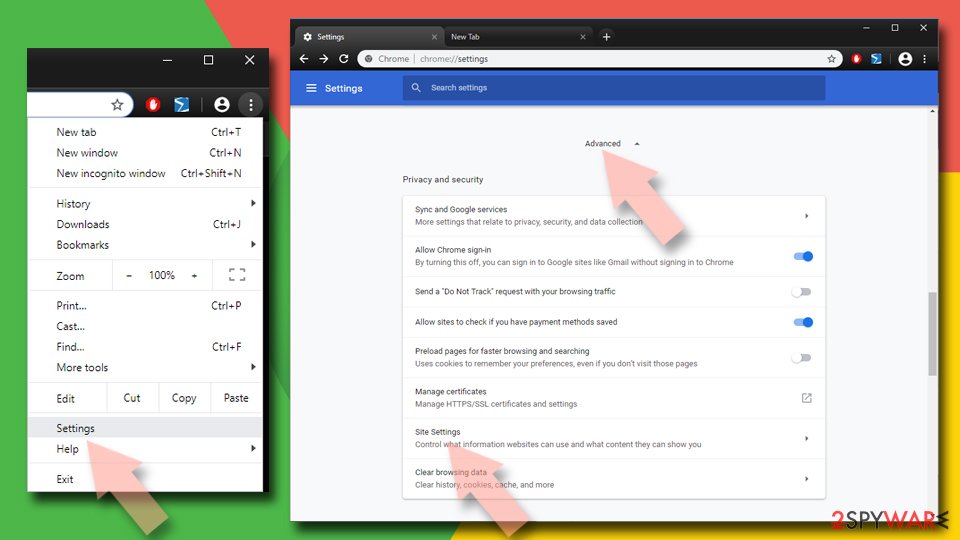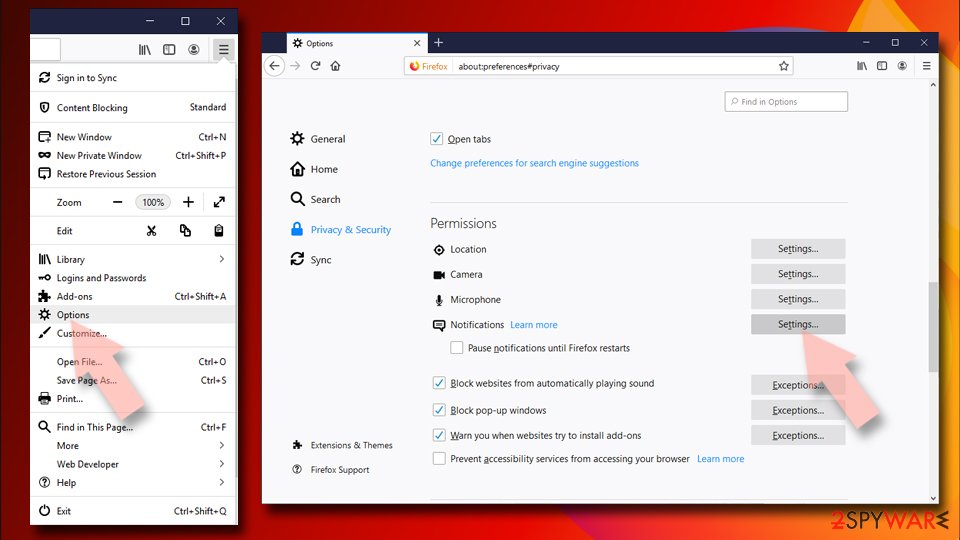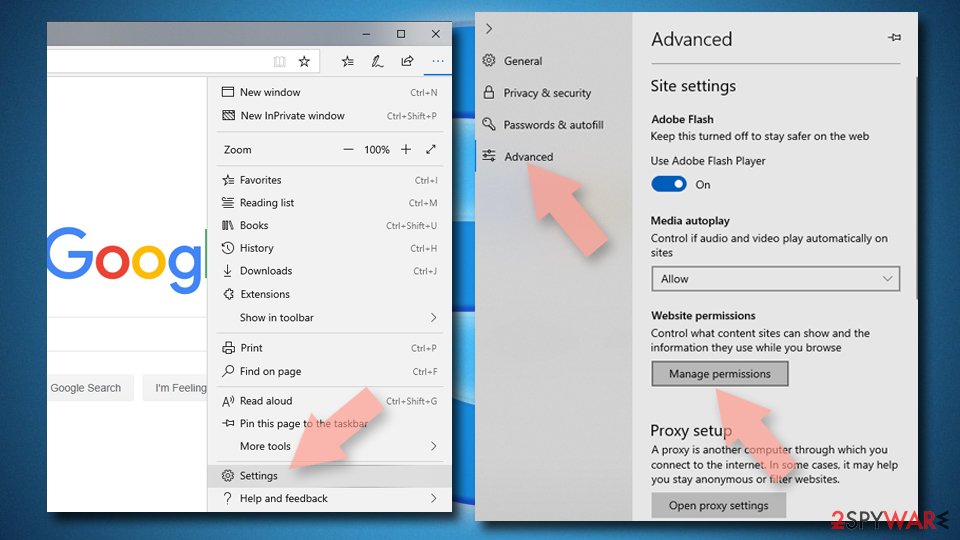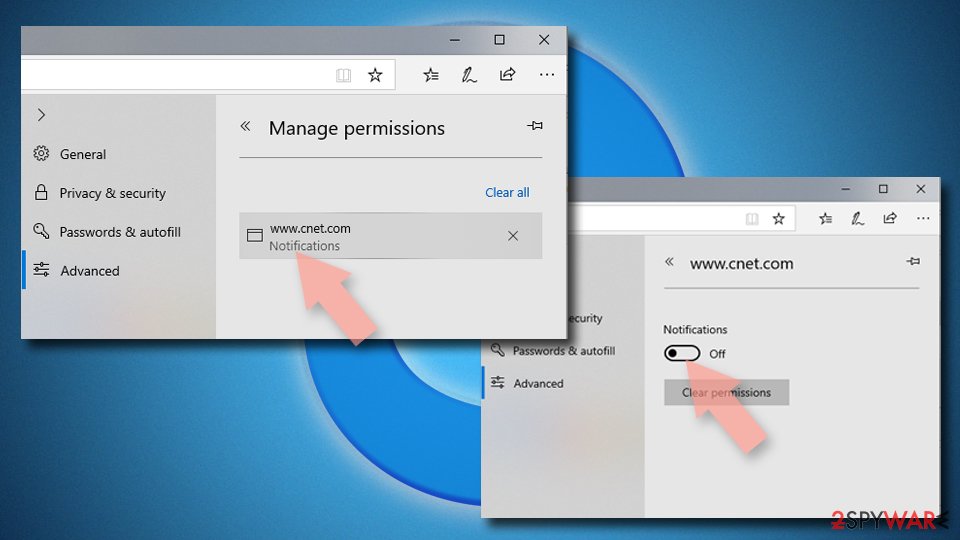Elideshub.com ads (spam) - Chrome, Firefox, IE, Edge
Elideshub.com ads Removal Guide
What is Elideshub.com ads?
Elideshub.com is a bogus site designed to trick people into subscribing to pop-ups
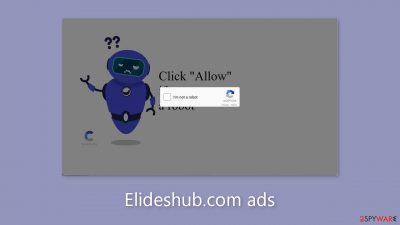
Elideshub.com is a scam website that tricks users into subscribing to push notifications by using misleading techniques. It uses a deceptive prompt that says, “Press 'Allow' if you are not a robot,” along with a CAPTCHA-like image for verification. However, there isn't any useful information on the website to explore.
By selecting “Allow,” users consent to being bombarded with intrusive pop-up ads, some of which continue to appear even after the browser is closed. Furthermore, it's possible that crooks are distributing ads leading to dangerous websites through rogue advertising networks. These embedded marketing links could unintentionally take users to phishing websites.
Users may unintentionally be pushed to download malicious software, divulge personal information, or install potentially unwanted programs (PUPs).[1] These pop-up advertisements frequently advertise adult websites, fake antivirus offerings, phony giveaways, surveys, and other similar scams. To protect your online experience, it is advised that you disable these pop-ups as soon as possible.
| NAME | Elideshub.com |
| TYPE | Push notification spam; adware |
| SYMPTOMS | Pop-up ads start appearing in the corner of the screen |
| DISTRIBUTION | Shady websites, deceptive ads, freeware installations |
| DANGERS | The ads can contain links leading to dangerous websites where users could get tricked into providing their personal information or downloading PUPs and malware |
| ELIMINATION | Go to your browser settings to disable notifications |
| FURTHER STEPS | Use a maintenance tool FortectIntego to get rid of any remaining damage and clear your browsers |
Distribution methods
It's uncommon to come across websites like Elideshub.com in search results. Such websites typically hide in questionable, uncontrolled areas of the internet. For instance, illegal streaming services[2] frequently use deceptive adverts and sneaky redirects, and fake “Play” and “Download” buttons[3] are occasionally present.
As a result, choosing trustworthy streaming services like Netflix or Hulu is advised. These services allow users the ability to safely access a variety of content in exchange for a small monthly subscription cost. Even if they appear to be advertisements for trustworthy products, it is crucial to use caution and refrain from clicking on random links and advertisements.
Freeware installations
Another possibility to take into account is the site appearing on its own, without any user intervention. This problem can occur when users are infected with adware, a class of software that supports advertising and is in charge of an influx of commercial content including pop-ups, banners, and redirects.
In order to monetize user activity, adware primarily spreads through platforms for the distribution of freeware, where it is included with other programs in the installation packages. It is essential to be watchful and consistently select the “Custom” or “Advanced” installation techniques during the installation procedure. Additionally, spend some time reading the Terms of Use and Privacy Policy. Examining the list of files carefully and unchecking any boxes next to unrelated software is the most important step.

Remove browser pop-ups
To get rid of intrusive pop-up ads, you have to go to your browser settings and block the permission manually. The process is quite simple, as we show below:
Google Chrome (desktop):
- Open Google Chrome browser and go to Menu > Settings.
- Scroll down and click on Advanced.
- Locate the Privacy and security section and pick Site Settings > Notifications.
![Stop notifications on Chrome PC 1 Stop notifications on Chrome PC 1]()
- Look at the Allow section and look for a suspicious URL.
- Click the three vertical dots next to it and pick Block. This should remove unwanted notifications from Google Chrome.
![Stop notifications on Chrome PC 2 Stop notifications on Chrome PC 2]()
Google Chrome (Android):
- Open Google Chrome and tap on Settings (three vertical dots).
- Select Notifications.
- Scroll down to Sites section.
- Locate the unwanted URL and toggle the button to the left (Off setting).
![Stop notifications on Chrome Android Stop notifications on Chrome Android]()
Mozilla Firefox:
- Open Mozilla Firefox and go to Menu > Options.
- Click on Privacy & Security section.
- Under Permissions, you should be able to see Notifications. Click Settings button next to it.
![Stop notifications on Mozilla Firefox 1 Stop notifications on Mozilla Firefox 1]()
- In the Settings – Notification Permissions window, click on the drop-down menu by the URL in question.
- Select Block and then click on Save Changes. This should remove unwanted notifications from Mozilla Firefox.
![Stop notifications on Mozilla Firefox 2 Stop notifications on Mozilla Firefox 2]()
Safari:
- Click on Safari > Preferences…
- Go to Websites tab and, under General, select Notifications.
- Select the web address in question, click the drop-down menu and select Deny.
![Stop notifications on Safari Stop notifications on Safari]()
MS Edge:
- Open Microsoft Edge, and click the Settings and more button (three horizontal dots) at the top-right of the window.
- Select Settings and then go to Advanced.
- Under Website permissions, pick Manage permissions and select the URL in question.
![Stop notifications on Edge 1 Stop notifications on Edge 1]()
- Toggle the switch to the left to turn notifications off on Microsoft Edge.
![Stop notifications on Edge 2 Stop notifications on Edge 2]()
MS Edge (Chromium):
- Open Microsoft Edge, and go to Settings.
- Select Site permissions.
- Go to Notifications on the right.
- Under Allow, you will find the unwanted entry.
- Click on More actions and select Block.
![Stop notifications on Edge Chromium Stop notifications on Edge Chromium]()
Get rid of cookies and cache
Avoiding dubious websites that are engaged in illegal activity is advised. These websites frequently use cookies to track your geolocation and IP address, giving them access to data about your online activity, such as the websites you visit, your search history, and your online transactions.
Cookies and cached data are tiny files that are saved on your system and may cause gradual device slowdown. After you have eliminated intrusive adverts, we advise maintaining your web browsers by clearing them frequently. This procedure can be automated using FortectIntego, which will improve system speed by erasing the information that websites have collected about you.
Scan your system with anti-malware tools
If the previous removal method did not work, this will most likely fix it. You have to eliminate the app that is causing the erratic behavior in the background from your system. Using SpyHunter 5Combo Cleaner or Malwarebytes professional security tools would make the process much easier for you as they can automatically remove intruders by scanning your system. Doing it manually does not work for everyone, as it is unclear which application is at fault.
However, if you still want to do this yourself, here are the step-by-step instructions:
Windows 10/8:
- Enter Control Panel into Windows search box and hit Enter or click on the search result.
- Under Programs, select Uninstall a program.
![Uninstall from Windows 1 Uninstall from Windows 1]()
- From the list, find the entry of the suspicious program.
- Right-click on the application and select Uninstall.
- If User Account Control shows up, click Yes.
- Wait till uninstallation process is complete and click OK.
![Uninstall from Windows 2 Uninstall from Windows 2]()
Windows 7/XP:
- Click on Windows Start > Control Panel located on the right pane (if you are Windows XP user, click on Add/Remove Programs).
- In Control Panel, select Programs > Uninstall a program.
![Uninstall from Windows 7/XP Uninstall from Windows 7/XP]()
- Pick the unwanted application by clicking on it once.
- At the top, click Uninstall/Change.
- In the confirmation prompt, pick Yes.
- Click OK once the removal process is finished.
macOS:
- From the menu bar, select Go > Applications.
- In the Applications folder, look for all related entries.
- Click on the app and drag it to Trash (or right-click and pick Move to Trash)
![Uninstall from Mac 1 Uninstall from Mac 1]()
To fully remove an unwanted app, you need to access Application Support, LaunchAgents, and LaunchDaemons folders and delete relevant files:
- Select Go > Go to Folder.
- Enter /Library/Application Support and click Go or press Enter.
- In the Application Support folder, look for any dubious entries and then delete them.
- Now enter /Library/LaunchAgents and /Library/LaunchDaemons folders the same way and terminate all the related .plist files.
![Uninstall from Mac 2 Uninstall from Mac 2]()
d
How to prevent from getting adware
Protect your privacy – employ a VPN
There are several ways how to make your online time more private – you can access an incognito tab. However, there is no secret that even in this mode, you are tracked for advertising purposes. There is a way to add an extra layer of protection and create a completely anonymous web browsing practice with the help of Private Internet Access VPN. This software reroutes traffic through different servers, thus leaving your IP address and geolocation in disguise. Besides, it is based on a strict no-log policy, meaning that no data will be recorded, leaked, and available for both first and third parties. The combination of a secure web browser and Private Internet Access VPN will let you browse the Internet without a feeling of being spied or targeted by criminals.
No backups? No problem. Use a data recovery tool
If you wonder how data loss can occur, you should not look any further for answers – human errors, malware attacks, hardware failures, power cuts, natural disasters, or even simple negligence. In some cases, lost files are extremely important, and many straight out panic when such an unfortunate course of events happen. Due to this, you should always ensure that you prepare proper data backups on a regular basis.
If you were caught by surprise and did not have any backups to restore your files from, not everything is lost. Data Recovery Pro is one of the leading file recovery solutions you can find on the market – it is likely to restore even lost emails or data located on an external device.
- ^ Chris Hoffman. PUPs Explained: What is a “Potentially Unwanted Program”?. Howtogeek. Technology Magazine.
- ^ Nina Khalouf. Illegal streaming websites spike in popularity. Eagleeye. News.
- ^ Andy Maxwell. Google Targets Fake ‘Download’ and ‘Play’ Buttons. Torrentfreak. Filesharing News.
